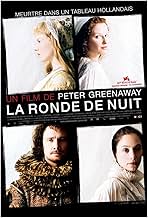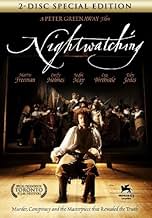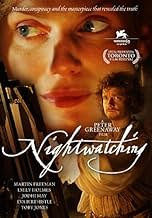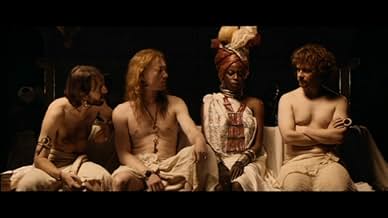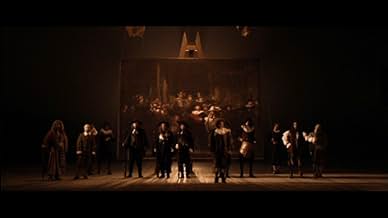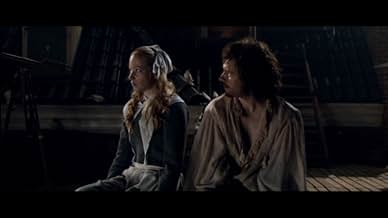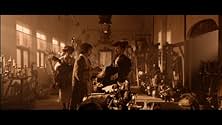Adicionar um enredo no seu idiomaAn extravagant, exotic and moving look at Rembrandt's romantic and professional life, and the controversy he created by the identification of a murderer in the painting 'The Night Watch'.An extravagant, exotic and moving look at Rembrandt's romantic and professional life, and the controversy he created by the identification of a murderer in the painting 'The Night Watch'.An extravagant, exotic and moving look at Rembrandt's romantic and professional life, and the controversy he created by the identification of a murderer in the painting 'The Night Watch'.
- Prêmios
- 6 vitórias e 6 indicações no total
- Catharina
- (as Anna Antonowicz)
Avaliações em destaque
I've tried to review this film in the context of Peter Greenaway's directing career as it's pretty critical to my appreciation. As much an artwork as any film itself, with a director who has had a long career, is how all the artworks come together as a ghost of their creator. The power of women over men is something that Greenaway has always reflected on in his films, and in that context Nightwatching represents a mellowing of his gaze. Always fascinated by women destroying men or cuckolding them in some way, Greenaway has made a film where the central character of the painter Rembrandt lives amongst women, and whilst often bewildering to him, they are companions. There are remnants of the past style at the beginning of the movie where during a family meal all the women in the room chant together, "Contemporary women are permitted to smoke, write, correspond with Descartes, wear spectacles, insult the Pope, and breast-feed babies.". The result here is charming as opposed to alarming. A far cry from "Deadman's Catch" in Drowning By Numbers (1988), a catching game where players are successively handicapped for missing catches, and finally wrapped in a winding sheet (traditionally used for corpses) when they lose. The women escape unscathed, perfect catchers, people that exist in some sort of harmony with life, who can find a place and a rhythm. In Nightwatching women still have that rhythm but they don't end up murdering their husbands! On the other hand Rembrandt does have to defend Hendrikje Stoffels from the advances of the callow and the licentious, and women, though with this rhythm are victims of men rather than succubi.
Another echo is a reference to cuckoldry, when Rembrandt discourses on how Potiphar was a cuckold who, "...slept with young men in order to avoid the temptation of his wife trying to screw Joseph". Apparently the Jewish tradition relating to Potiphar related in the Talmud, is that Potiphar bought Joseph as a catamite. Rembrandt learnt this from a rabbi friend of his, an interesting fact in a very well researched movie.
I've seen many Rembrandt drawings and paintings in museums, but I never knew that he had actually produced a small number of erotic works, which is something that Greenaway draws out in his extremely ribald Rembrandt. A fierce critic of Rembrandt, Andries Pel, who despised Rembrandt's realism, in 1681 wrote of his females nudes, "...the traces of the lacings of the corsets on the stomach, of the garters on the legs must be visible if nature was to get her due.". Rembrandt's fascination with this sort of thing is again picked up on by Greenaway.
When I went to the Rijkmuseum in Amsterdam and stood in front of the Night Watch, I very much felt that the men in the painting were poseurs and dandies and that I had no interest in the painting because of this. That though was precisely Rembrandt's point, and Greenaway really helped to bring the painting and much of his other work alive. Something that Greenaway has said about this film is that Amsterdam for a time in the 1640s was a place of unregulated wealth gathering by a handful of civil dynasties, similar to modern Russia.
I felt that in line with what I'm saying about mellowing and maturity, the choice of composer Giovanni Solamar, who is far less famous than frequent collaborator Michael Nyman, follows along the same trajectory, the music is far less flashy, but somehow full of confusion and elegiac tones, more consistent with a film from an older and wiser filmmaker.
I felt that I could connect with Rembrandt's grief at the death of his wife Saskia, and that there was something quite special about that. Despite the fact that Greenaway manages to build scarce suspense around the uncovering of the treachery that Rembrandt seeks to expose, I think it's a film that I will remember forever, with several, to my mind, iconic scenes. I think it helped immensely in my taking in of the film that Martin Freeman looks so much like Rembrandt, especially with the care and attention the hairdressers heaped upon him, something that's quite critical when you have a man so famous for self-portraiture.
What I found most ironic, and what really bowled me over, was how "unexperimental" this film seemed. After his recent directorial forays ("8 1/2 Women" and the "Tulse Luper Suitcases" come to mind), "Nightwatching" will seem unexpectedly boring in comparison. One might anticipate a visual spectacle, an overwhelming of the senses as seems to be Greenaway's modus operandi. The real richness of "Nightwatching" is in the little things, the simplest of details, and the pure joy of watching a master working within a more traditional cinematic framework.
When I think of the impact "Nightwatching" had on me initially, I am reminded of a similar experience when I recently viewed Lars Von Trier's "Antichrist". I was rather caught off-guard by "Antichrist's" lack of overt experimentation. But as someone who appreciates subtlety and nuance in film, I felt my time was well-spent. Plus, there's nothing I like more than walking away feeling as if I haven't been spoon-fed a story, that I've been allowed to use my BRAIN, and fill in the blanks a bit as the story moves along.
I find it doubly ironic that this film was released internationally in 2007, and only recently released domestically in the US (2010), and to lukewarm reviews at best. Greenaway is an artist never to be underestimated, and I implore you to give this film your utmost attention. It's also kinda cool to see Greenaway "geek out" a bit -- he's so obsessed with Remembrandt and all things Dutch, enjoy!
There are references to the earlier films, most obviously - to the 'Contract', the latest are so strong that sometimes one may think it is a deep 'remake' of that earliest Greenways' work.
While the presentation is generally easier-going then in some previous films, it does not mean loss of depth and loads of small details (for which the film deserves a HD version - something to appear, probably, in the year 2107?). Like all Greenway films, this one to be watched many times to discover new and new layers.
The historic plot is doubtful however neither naive nor unrealistic. And most likely it is just a canvas to put the ideas on: which present in numbers.
Some viewers have pointed out how moving the film is - and indeed it is. But I for one have found ALL of Greenaway's films to be deeply moving. Unlike mainstream directors, he doesn't attempt to tug at the heartstrings, but instead deploys one rich, elegaic, achingly beautiful set piece after another, letting the ideas and associations reach the emotions of the audience. In Greenaway's world, extreme beauty and extreme horror exist cheek-by-jowl - his heroes (more so than his heroines) look for logic and order, and find ultimately chaos and decay - the good go unrewarded, the bad go unpunished - and yet, out of it all, rises a triumphant celebration of life, art, human aspiration, and the possibilities of cinema itself.
If you want a bedtime story about goodies overcoming baddies, look elsewhere. 'Nightwatching', like Greenaway's other work, offers - and demands - much more than that.
Você sabia?
- CuriosidadesDirector Peter Greenaway has said of this film: "The 'painter film' is a small genre of its own: Michelangelo, Rembrandt himself (at least twice), Modigliani, Caravaggio, etc, and none more so than just lately. Picasso, Van Gogh (repeatedly), Bacon, Vermeer, and now Goya have received the treatment. I suppose our major aim in the film Nightwatching, apart from trying to match the Master's mastery of light, is to demonstrate Rembrandt as social moralist: it contains a murder mystery - the unraveling of which is the heart of the film. And also to regard Rembrandt as an inventor of cinema before the Lumière brothers...We tried to rise to the challenge in the film, remaking, with high definition digital tape, that upper right-hand corner space of Velázquez's Las Meninas - the area between the walls and ceiling has been described as the greatest bit of painting ever - a painting which is just and only and magnificently a painting of a block of darkly contrasting air. We, too, attempting a grand response Rembrandt image of light, tried to film a block of air that insubstantially floats, irrespective of walls and ceiling. Godard said that the cinema was the truth 24 frames a second. Can painting go better and say that paintings are the truth for all time? What's a second in cinema time if you can have an eternity in painting time? Cinema has come and gone in 112 years. What, then, is the age of painting?".
- Erros de gravaçãoAt 1:36:42 Rembrandt says that Geertje doesn't wash herself. Just 1 minute later he says he saw her undressing to wash.
- Citações
Titia Uylenburgh: Women in the 17th century are allowed to smoke, write, correspond with Descartes, wear spectacles, insult the Pope, and breast-feed babies.
- ConexõesFeatured in Rembrandt's J'Accuse...! (2008)
Principais escolhas
- How long is Nightwatching?Fornecido pela Alexa
Detalhes
Bilheteria
- Orçamento
- US$ 7.500.000 (estimativa)
- Faturamento bruto mundial
- US$ 698.544
- Tempo de duração2 horas 14 minutos
- Cor
- Mixagem de som
- Proporção
- 2.35 : 1
Contribua para esta página



